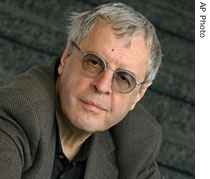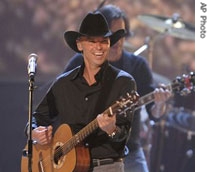VOA慢速英语 2008 0523b
时间:2018-12-15 作者:英语课 分类:VOA慢速英语2008年(五)月
AMERICAN MOSAIC 1 - Country Music: Chesney Sees 'Complete Disrespect' in Web Voting
Also: Charles Simic decides against seeking another year as U.S. poet laureate. And a question from Japan about the nation's Founding Fathers -- and Founding Mothers. Transcript 2 of radio broadcast:
22 May 2008
HOST:
Welcome to AMERICAN MOSAIC in VOA Special English.
(MUSIC)
I’m Doug Johnson.
Today we tell about some country music award winners ...
Answer a listener’s question about the founding fathers, and mothers, of the United States ...
And report on the nation’s poet laureate.
(MUSIC)
Charles Simic
HOST:
Charles Simic has served as America’s poet laureate for almost a year. He says he will not seek a second year because he wants to spend more time writing. Barbara Klein tells about the man and his poetry.
BARBARA KLEIN:

Charles Simic
Charles Simic was born in Belgrade, Yugoslavia in nineteen thirty-eight. He says he spent his early years avoiding bombs dropped by German and Allied 3 forces during World War Two. He became one of the millions of displaced 4 persons.
He said the experience provided him with his own little story of bad luck as well as those of many other people. His poem, “Prodigy,” speaks of his wartime life. Here he reads it:
(SOUND)
Charles Simic came to the United States when he was sixteen years old. He lived with his parents in Chicago, Illinois. His first book of poems was published when he was just twenty-one. He served in the Army and later graduated from New York University. Mister Simic is a retired 5 professor of American literature and creative writing at the University of New Hampshire, the state where he still lives. He also writes essays about art, ideas and beliefs and music.
The poet can speak several languages. He has translated poetry by writers in French, Serbian and other languages. Mister Simic said being poet laureate of the United States was an especially great honor because, he said, “I am an immigrant boy who didn’t speak English until I was fifteen.”
Charles Simic has written more than twenty books of poetry. He has won a MacArthur Fellowship 6 and a Pulitzer Prize. The same day he was named Poet Laureate he won the Wallace Stevens Award for Mastery in the Art of Poetry. The award, given by the Academy of American Poets, comes with a one hundred thousand dollar prize.
Last month, Charles Simic published a new book of poetry called “That Little Something.”
America’s Founding Parents
HOST:
Our listener question this week comes from Japan. Fumio Nishimoto and his students want to know about America's Founding Fathers -- and Founding Mothers.
Most Americans know about their country's Founding Fathers who created and established the new government of the United States. These included the men who signed the Declaration 7 of Independence. This document announced the American colonies' separation from England in seventeen seventy-six. The Founding Fathers also included men who fought in the American Revolutionary War to win independence. And they included the men who helped write the United States Constitution in seventeen eighty-seven.
The most famous Founding Fathers included George Washington, Thomas Jefferson, John Adams, James Madison, Alexander Hamilton, John Hancock and Benjamin Franklin.
Most of the Founding Fathers had wives, mothers, sisters and daughters who also played important parts in the birth of the new nation. These women defended their homes during the war. They supervised 8 their husbands' businesses, provided them with political advice and supported their efforts.  Who were these Founding Mothers? Reporter Cokie Roberts wrote a book about them called "Founding Mothers: The Women Who Raised Our Nation."
Who were these Founding Mothers? Reporter Cokie Roberts wrote a book about them called "Founding Mothers: The Women Who Raised Our Nation."
Miz Roberts studied the personal letters and private writings of these women to tell their stories. She writes about Martha Washington and Abigail Adams, the wives of the country's first and second presidents. During the Revolutionary War, Martha Washington helped the troops survive a severe winter at Valley Forge 9, Pennsylvania. She treated their wounds, made clothing for them and kept them from leaving.
Miz Roberts also writes about some women who were not as well known. For example, Deborah Read Franklin was the wife of Benjamin Franklin. While her husband was serving in Europe, she supervised the postal 10 service and her husband's businesses and properties in Philadelphia, Pennsylvania. She also used a gun to protect the Franklin house against an angry crowd.
Cokie Roberts writes that the efforts of these women for their families and their country were just as important to building the new nation as the rebellion 11 that established it.
Country Music Awards
HOST:
The Academy of Country Music held its forty-third yearly awards ceremony Sunday night in Las Vegas, Nevada. For the first time, fans picked the winner of the top award through voting over the Internet. Mario Ritter tells about the winners and plays some of their music.
(MUSIC: "Better as a Memory")
MARIO RITTER:

Kenny Chesney
That was Kenny Chesney, winner of the Academy of Country Music entertainer of the year award for the fourth time in four years. He welcomed the praise and thanked his fans. But he criticized the new method for choosing the winner of the big award.
Chesney said the online voting showed “complete disrespect” to the artists. He said it turns the award into a “sweepstakes to see who can push people’s buttons the hardest on the Internet.”
Carrie Underwood and Brad Paisley won as best female vocalist and best male vocalist for a second year. Here they sing “Oh Love.”
(MUSIC)
Miranda Lambert was honored with the award for album of the year for “Crazy Ex-Girlfriend.” Listen to the title song from that album.
(MUSIC)
Finally, the band Sugarland won the Academy of Country Music award for best single record and song of the year. We leave you with “Stay.”
(MUSIC)
HOST:
I'm Doug Johnson. I hope you enjoyed our program today.
It was written by Shelley Gollust and Caty Weaver 12, who was also our producer. Charles Simic’s reading was provided by the Poetry Foundation. To read the text of this program and download audio, go to our Web site, voaspecialenglish.com.
Join us again next week for AMERICAN MOSAIC, VOA’s radio magazine in Special English.
- The sky this morning is a mosaic of blue and white.今天早上的天空是幅蓝白相间的画面。
- The image mosaic is a troublesome work.图象镶嵌是个麻烦的工作。
- A transcript of the tapes was presented as evidence in court.一份录音带的文字本作为证据被呈交法庭。
- They wouldn't let me have a transcript of the interview.他们拒绝给我一份采访的文字整理稿。
- Britain was allied with the United States many times in history.历史上英国曾多次与美国结盟。
- Allied forces sustained heavy losses in the first few weeks of the campaign.同盟国在最初几周内遭受了巨大的损失。
- Gradually factory workers have been displaced by machines. 工厂的工人已逐渐被机器取代。
- He was displaced by another young man. 他已被另一个年轻人顶替。
- The old man retired to the country for rest.这位老人下乡休息去了。
- Many retired people take up gardening as a hobby.许多退休的人都以从事园艺为嗜好。
- You'll lose your fellowship if you do that.你如果做那件事就会丧失研究员职位。
- It looks that they'll be admitted to the fellowship.看来他们要被吸收入会了。
- We read the declaration posted on the bulletin board.我们读了贴在布告板上的声明。
- At the recent convention a declaration was adopted.在最近举行的大会上通过了一项宣言。
- The architect supervised the building of the house. 建筑工程师监督房子的施工。 来自《简明英汉词典》
- He supervised and trained more than 400 volunteers. 他指导和培训了400多名志愿者。 来自辞典例句
- Everything new comes from the forge of hard and bitter struggle.一切新东西都是从艰苦斗争中锻炼出来的。
- Difficulties help to forge people into able folk.困难有助于把人们锻炼成能干的人。
- A postal network now covers the whole country.邮路遍及全国。
- Remember to use postal code.勿忘使用邮政编码。